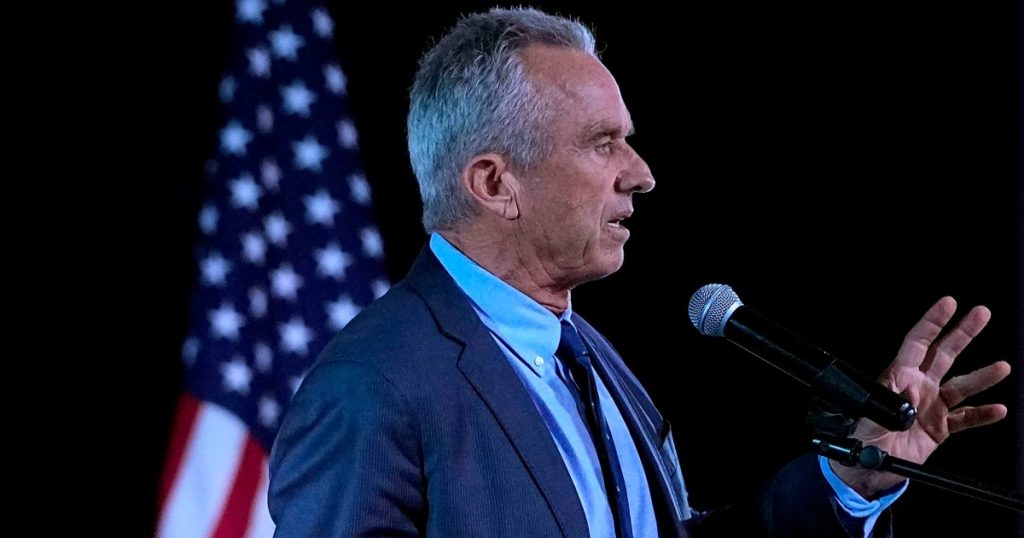RFK Jr. Is Planning to Speak at a Conference Featuring a Guy Who Talks About Jews Controlling the World
Independent presidential candidate Robert F. Kennedy Jr. speaks at a voter rally, Wednesday, Dec. 20, 2023, in Phoenix. Matt York/AP
Fight disinformation: Sign up for the free Mother Jones Daily newsletter and follow the news that matters.Next month presidential candidate and anti-vaccine activist Robert F. Kennedy Jr. is going to Vegas to headline RePlatform and Create the Freedom Economy, a conference wherein the indignant, self-proclaimed censored class will gather to commiserate about their unjust treatment and plan for a new world. The organizers, the same team behind the 2022 anti-vaccine rally Defeat the Mandates, hope to accomplish this goal by “bringing together inventors, banks, payment systems, hackers, developers, investors, entrepreneurs, and creators to craft real products that work around the incompetence, stagnation, and censorship in Corporate America.”
Those who have been following the weird trajectory of RFK Jr.—from environmental advocate to vaccination antagonist—will not be surprised to learn that the RePlatform conference has a robust anti-vaccine presence. One of Kennedy’s fellow speakers is Steve Kirsch, the Silicon Valley rich guy who somehow went from helping to invent the computer mouse to bankrolling research on early Covid treatments to antagonizing everyone—from scientists to his seatmates on planes—with his anti-vaccine rhetoric. Another is Mikki Willis, the mastermind behind the Covid conspiracy video “Plandemic.” The pièce d’anti-vax résistance at this conference is the world premiere of a universe-expanding project from Willis: Plandemic: The Musical! (No, really.)
But this conference is much more than just an anti-vaccine extravaganza. RePlatform contains multitudes: Take Lonnie Passoff, president of alternative payment company Green.Money, who recently went on the show of bounty hunter turned far-right livestreamer Stew Peters. Passoff and Peters discussed the unfairness of Visa and Mastercard refusing to do business with Andrew Torba, the CEO of the far-right social media platform Gab.
PETERS: “So he was making, like, violent threats?
PASSOFF: “No, I don’t think it was violent threats, terroristic threats, no hate speech. Well, according to them, hate speech. So if you say anything bad about the Jewish state of the Jews or anything—
PETERS: Oh, sure, that’d be the scientific lobby that controls the entire economy and the media and our entire government.
PASSOFF: One hundred percent.
The CEO of Gab’s payment platform, Gab Pay, is also speaking at the conference. Another presenter is erstwhile presidential candidate Wayne Allyn Root, who has claimed that the 2020 election was stolen from Donald Trump, that the 2017 Las Vegas mass shooting was orchestrated by ISIS, and that Obama was a gay non-US-citizen. Yet another presenter is Ashton Cohen, creative manager at PragerU, an education platform known for its anti-trans and climate-change denialist content.
Yes, there’s more! In addition to the extremist speakers, there are some wild cards. The founders of Pronatalist, a group that encourages people to have more babies because of “demographic collapse” and partners with a gifted school (but totally isn’t into eugenics at all!) are leading a session called “We Need Babies: The Economic Case for Fertility.” An ad agency called Red Brand Media (tagline: “Conservative like you”) is offering a session called “Banned on Social Media? Thriving in the Parallel Economy After Cancellation & How to Use Mainstream Social Media to Your Advantage in the Parallel.”
What do all these conference speakers have in common? In short, they have figured out how to use their cancellation for their own gain. When I shared the conference website with Mallory Harris, who studies infectious disease and misinformation as a PhD candidate at Stanford University, she remarked on the fact that the conference organizers are “still going with this censorship narrative,” even though most of the high-profile previously censored accounts on X have since been reinstated.
There is a reason that they are clinging to the cancellation outrage. Jonathan Jarry, a science communicator at McGill University’s Office for Science and Society, who has been following the campaign of Robert F. Kennedy, Jr., noted that during the pandemic, claiming to be censored became extremely lucrative. He gave the example of alternative health tycoon Joseph Mercola, a friend of RFK Jr.’s, who has put a library of articles that Mercola claims were censored behind a paywall. Influencers have figured out how to “profit from the actions of privately owned social media companies who feel like these influencers have violated their terms of service,” says Jarry. “They call that censorship, and then they financially benefit from that, which is, in a way, quite brilliant.”
In participating in RePlatform, Robert F. Kennedy Jr. is making a gamble. On the one hand, it could be a liability for him to appear alongside extremists like Passoff and Root. On the other, there is value in portraying himself as the King of the Canceled—just ask the other guy who is making hay from claiming to be persecuted.
Kennedy may also be making a play toward more left-leaning voters. One major theme of the conference is a robust skepticism of banks and the finance industry. Yesterday, Kennedy posted a video on X about the brutality of private equity takeovers. That’s a real thing to worry about; just ask Mother Jones: We recently published a package on private equity—that RFK Jr. cited in the video.
Basically, the RePlatform crowd and their ilk are capitalizing on financial worries on both ends of the political spectrum, said Jarry. He gave the example of conspiracy theorists’ insistence that soon we will no longer be able to own goods. That’s an overstatement, but it’s true that the subscription-based economy is ascendant—and the success of services like Netflix and Spotify raises new questions about consumers’ rights. Anxiety around the economy is “a real concern, and we need to engage with it,” said Jarry. “When we don’t, then people will turn towards the conspiracy theorists.”





